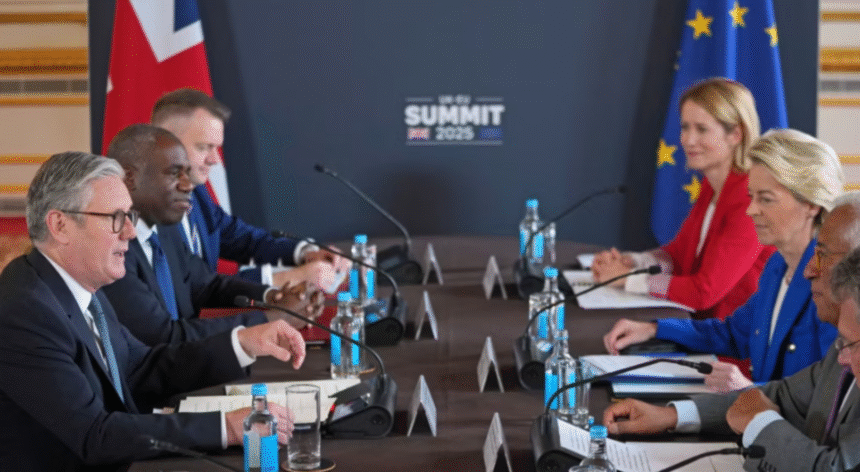What Does the UK-EU Agreement Contain?British Prime Minister Keir Starmer signed an agreement on Monday with leaders of the European Union in London, launching a new chapter in UK-EU relations following Brexit in 2020.
The deal covers several areas:
Security and defense: The UK and EU agreed to cooperate on security and defense at a time when Europe is rearming in response to threats from Russia and uncertainties surrounding U.S. President Donald Trump’s policies. The agreement allows British representatives to attend certain EU ministerial meetings and participate in European military exercises and missions. It also aims to integrate the UK’s defense industry into European efforts to build a domestic industrial base. British firms could benefit from the EU’s proposed €150 billion fund, currently under negotiation by the 27 EU member states, though a separate agreement and financial contribution from London would be required. UK companies such as BAE Systems and Rolls-Royce are expected to gain significantly.
Food and pets: The UK and EU agreed to reduce checks on food and plant products—one of London’s key demands. The agreement text states that “the vast majority of movements of animals, animal products, plants, and plant products between the UK and the EU will be conducted without certificates or checks required under current regulations.” The EU remains the UK’s largest trading partner, but UK exports to the continent have fallen by 21% since Brexit, and imports have declined by 7%. After a long pause, the UK will once again be able to sell burgers, seafood, sausages, and other products to the EU, according to Starmer. UK citizens will also be able to travel more easily with their pets. In return, the UK has committed to a dynamic alignment—meaning it will adapt over time—with the EU’s sanitary and phytosanitary rules, with possible exceptions. In case of disputes, an independent mechanism will be created to resolve issues, but the European Court of Justice will remain the final authority.
Other economic measures: The two sides agreed to closer cooperation on emissions trading quotas, allowing UK companies to avoid the EU’s carbon border tax. According to the UK government, these measures could add approximately €10.7 billion to the British economy by 2040.
Fishing: Fishing was a particularly important issue for France, which made it a condition for any broader deal between London and Brussels. The UK agreed to extend until June 2038 an existing agreement that allows EU vessels to fish in British waters and vice versa. The current deal was set to expire in 2026. The extension will provide stability and predictability for fishing crews without increasing the amount of fish EU boats can catch in UK waters, the UK government said. In Scotland, the reaction was immediate and critical. The fishing sector “appears to have been abandoned” by London, said Scottish First Minister John Swinney. The Scottish Fishermen’s Federation described the deal as a “horror movie.” French Minister Agnes Pannier-Runacher, who oversees the fishing sector, welcomed the deal, saying it “will ensure economic and political visibility for French fishing.”
Youth movement: Brussels pushed for an agreement on youth mobility, which would allow young Europeans to study and work temporarily in the UK and vice versa. However, London remains cautious of any agreement that resembles free movement and could increase immigration. No clear agreement was reached on Monday, and the word “mobility” does not appear in the final text. Instead, both sides expressed a willingness to “work on a balanced program” allowing young people to work, study, volunteer, or travel in the UK and EU for a limited time. The terms of the program are not yet defined. London and Brussels also discussed the possibility of the UK rejoining the Erasmus+ student exchange program. The number of EU students in the UK has halved since Brexit, dropping from around 148,000 in 2019–2020 to 75,500 in 2023–2024.
Border crossings: To ease border procedures, both sides committed to “continue discussions” to allow UK nationals to use more eGates—automated passport control gates. According to the UK government, this should help British holidaymakers avoid “horrendous queues” at EU airports.







